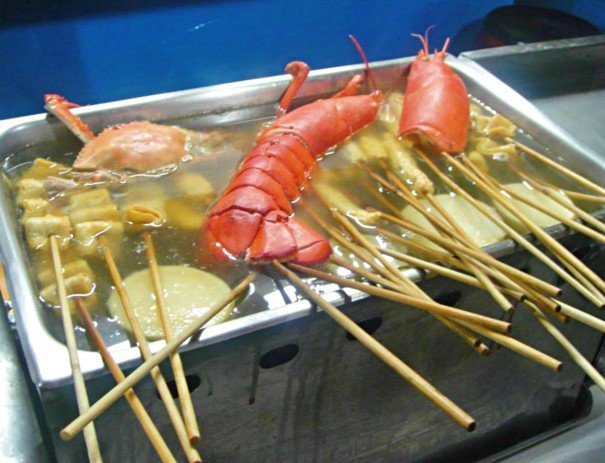
A Nomad’s Home Is Where the Spicy Fish Cakes Are

A Nomad’s Home Is Where the Spicy Fish Cakes Are
Topokki on Haeundae Beach
Every summer since I graduated from high school, I’ve embarked on an epic journey from New York, London, or wherever I was living to Taipei, Bangkok, or Seoul to visit my family. Perpetual expats, they’ve been on the move since 1990, when I was a baby. While my college and grad school friends returned to the house they grew up in, my “childhood” bedroom changed every summer, as did the food I ate.
Breakfast meant anything from a haphazard sunny-side up egg to grandma’s Malaysian fried noodles to something unidentifiable and deep-fried on a stick I’d grab on the street after an all-night rave. Like my vagabond lifestyle, the morning meal—a staple upon which cultures and identities are built—was persistently inconsistent, something fleeting to be savored in the moment, rather than a drawn-out gastronomical process to ground me to a particular place.
Two years ago, when I was moving from London back to New York, my family moved to Seoul. I visited them and planned a trip with equally transient, polyglot friends to the southern South Korean city of Busan, known for its beaches, parties and street food.
Stepping off the metro at Haeundae Beach, the whiff of snacks being tossed and fried competes with saltwater smells. Vendors beckon travelers with hotteok (pancakes stuffed with honey and nuts), topokki (spicy rice cakes) and eomuk (fish cakes).
On our last night, we stayed out until 5am. After twirling glow sticks and jumping up and down like fools in a beachside club whose name I can’t remember, we were starving. Stepping out from the dimly-lit club, the light from the purplish-pink sunrise was startling. Vendors were unzipping their tents and setting up for the day. The makkoli (rice wine) and soju (ethanol and water) which had fueled the night were burning away in our stomachs and uncooked topokki and eomuk pierced with skewers, dipped in boiling tin cans shared with severed lobster heads and crab claws, never looked so appetizing.
I ordered topokki and my friends ordered corn dogs. I watched the vendor dip my topokki into sticky blood-red chili sauce, twirling it round and round, making sure to scoop up every bit of the stickiness. We then proceeded to the beach with our skewered delicacies. It was my fourth or fifth time eating topokki (and my first time having it on a stick) but the wave of sweetness interlaced with spiciness still overpowered my taste buds as I bit into it.
Topokki is a basic snack food in Korea. Inexpensive and requiring minimal preparation, it can be bought and eaten at any time of the day, in any situation. In other words, it’s easily adaptable. Compared to bibimbap or bulgogi, topokki is not exactly my top pick for best Korean dish—it’s too gooey and starchy for my palate—but it’s a quick-fix for extreme hunger after a night of debauchery.
Around us, hardworking ajummas (little Korean ladies) with elbow-high surgical gloves and visors clack their tongs as they scurry in the sand picking up garbage from partygoers. Some distance away, a guy in his 20s is lying passed-out on his back flat on the ground with a cigarette sticking out of his mouth and a lighter in his right hand. A young mother and her kindergarten-aged child on an early morning stroll walk pass us and we ask her to take our picture.
The day before our beach breakfast, I had a small breakdown and was blubbering to my friends about how I was always on the move and didn’t have a “home.” And after that breakfast, we parted. I moved to New York, then Taipei, another friend relocated to Nairobi, then Washington, DC and the third one to Arizona, then Seoul.
When I look at the picture two years later—three giddy girls with makeup running down their faces—I know I was right about always being on the move, but on Haeundae Beach that morning, relishing my 5 am topokki, I was right at home.